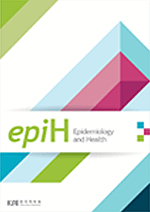Causal effect of fasting serum glucose on atherosclerotic cardiovascular disease: a multivariable Mendelian randomization
- 한국역학회
- Epidemiology and Health
- 46
-
2024.011 - 10 (10 pages)
-
DOI : 10.4178/epih.e2024096
- 0

OBJECTIVES Observational studies have reported that diabetes is a risk factor that increases the risk of atherosclerotic cardiovascular disease (ASCVD). However, the causal relationship remains a matter of debate. This study aimed to analyze the relationship between fasting serum glucose (FSG) and ASCVD. METHODS This study used data from the Korean Cancer Prevention Study-II (KCPS-II) Biobank, consisting of 159,844 people recruited with consent from 18 health examination centers from 2004 to 2013. Outcomes were confirmed based on diagnoses on hospital discharge summaries from National Health Insurance System. We used linear and non-linear Mendelian randomization (MR) methods. The outcome data were obtained from KCPS-II, and the exposure data were derived from the Korean Genome Epidemiology Study. RESULTS First, a prospective cohort study estimated that for each 10 mg/dL increase in FSG level, the risk of ASCVD increased by 5% (hazard ratio [HR], 1.05; 95% confidence interval [CI], 1.04 to 1.06). Second, the 2-sample MR study showed that every 10 mg/dL increase in FSG influenced the risk of ASCVD (odds ratio [OR], 1.11; 95% CI, 1.04 to 1.18). Third, the multivariable MR study showed that the OR per 10 mg/dL increase in FSG on ASCVD was 1.14 (p<0.001). Similar results were found for a 10 mg/dL increase in FSG and ischemic heart disease (IHD), but a significant relationship with stroke was not found. When performing non-linear MR, a linear relationship was observed between fasting blood sugar and ASCVD, including IHD and stroke. CONCLUSIONS FSG showed a linear and causal association with IHD, but not with stroke.
INTRODUCTION
MATERIALS AND METHODS
RESULTS
DISCUSSION
NOTES
REFERENCES
(0)
(0)